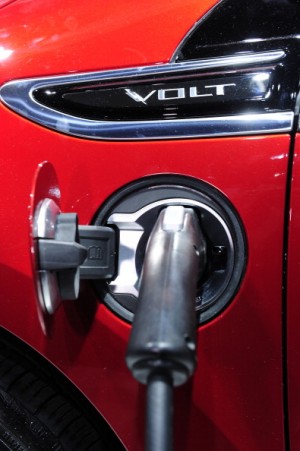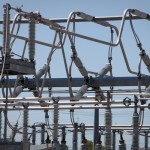Why Electric Cars May Not End Up Stressing the Texas Grid

Photo by Robyn Beck//AFP/Getty Images
The Chevrolet Volt charges at the Consumer Electronics Show in 2011
The rise of electric cars in Texas has brought up a concerning scenario: What if too many cars charge their batteries at the wrong time, potentially overloading the Texas grid? If, say, thousands of cars all plug in during a hot Texas summer weekday afternoon, when power supplies are already tight, would it possibly be enough to push those slim margins past the edge?
A new analysis suggest there may not be much to worry about after all.
The folks behind Texas’ grid have claimed in recent years that there isn’t cause for concern. “In the long term, there could be some impact to our resource adequacy challenge, but my belief is that’s not a significant issue in the near term,” Trip Doggett, head of the Electric Reliability Council of Texas (ERCOT), which manages the state’s grid, told lawmakers earlier this year. And new data from the Pecan Street Research Institute — a petri dish of renewable energy experimentation in Austin — back up that claim.
The Pecan Street Research Institute monitors a collection of homes in Austin that have renewable energy and sustainability features like electric cars, smart thermostats and solar panels. Looking at thousands of charging events for electric cars at 30 of those homes over the summer, the group found that “only 22 percent of weekday … charging occurred during peak electric demand hours.” For customers who had chosen to sign up for an option plan that gave them cheaper charges during off-peak hours, the charging during those peak times was even lower, occurring only 12 percent of the time. (On average, the customers spent less to charge their cars for a whole month than it would cost to fill up a Prius once, the analysis claims.)
If everyone got home at the same time and started charging immediately, it could spell trouble. But the average charge time for participants during the week was under two hours, enough for their daily commute. “We still have a lot of consumer research ahead of us, but these findings suggest that this new load is not only manageable, but movable,” Brewster McCracken, head of the Pecan Street Research Institute, said in a release accompanying the analysis.
You could likely see more electric cars on the road in the coming years. The electric car company Tesla is installing quick-charge stations throughout the Texas Triangle, allowing users to travel from Austin to Dallas to Houston and back. And this week eight states (Texas is not one of them) announced a joint plan to get 3.3 million zero-emission vehicles on the road over the next twelve years through incentives. Texas has no state incentives for electric cars, but some cities, like Austin and San Antonio, have installed many charging stations to help spur growth.

